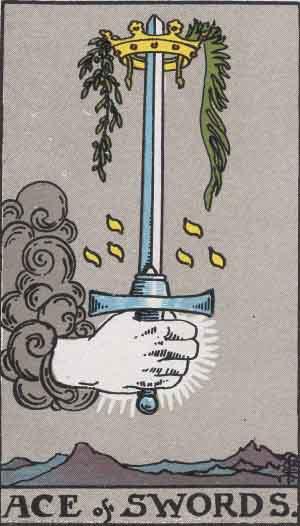The Ace of Swords reversed often represents mental fog, miscommunication, and a lack of clarity. When this card appears in a reading about how someone perceives you, it suggests they may see you as confused, indecisive, or withholding. The upright Ace of Swords is a symbol of sharp intellect and clear communication, but in reverse, these qualities become muted or distorted, leading to misunderstandings and a sense of being misunderstood.
When exploring how this card reflects perceptions, it’s important to consider the context. Relationships, work, health, and spirituality all interact differently with the energy of this card. In each case, the reversal adds a layer of complexity, suggesting that the person in question might see you as enigmatic or struggling to articulate your truth.

Ace of Swords Reversed As How Someone Sees You in Love and Relationships
In love and relationships, the Ace of Swords reversed can indicate that someone sees you as difficult to read or hesitant to express your true feelings. They might perceive a lack of directness in your communication or feel that you’re holding back emotionally. This could lead to a sense of frustration or confusion about where they stand with you.
For singles, this card might suggest that a potential partner sees you as uncertain or unready for a relationship. They might sense that you’re not fully clear on what you want, which could make them hesitant to pursue a deeper connection. For those in new relationships, the reversal may indicate that your partner feels you’re guarded or not fully transparent, which can cause doubt about the future of the relationship.
In established relationships, the Ace of Swords reversed could mean your partner sees you as disengaged or struggling to communicate effectively. They might interpret your actions as avoiding confrontation or avoiding discussing important issues. If you’re asking about getting back together with an ex, this card suggests they see you as someone who hasn’t moved past the confusion or pain of the breakup, making reconciliation seem challenging.
Ace of Swords Reversed As How Someone Sees You In Career And Business
From a career and business perspective, the Ace of Swords reversed suggests that someone might see you as unfocused or lacking direction. They may feel you struggle to make decisions or articulate your goals clearly. This perception can impact their trust in your ability to lead or deliver results.
When starting a new job, this card might mean your new employer or colleagues see you as still finding your footing. They might notice hesitation or uncertainty in your approach, interpreting it as a lack of confidence. For those currently employed, the reversal could indicate that coworkers or supervisors see you as overwhelmed or unsure about your role’s responsibilities, potentially leading to miscommunications.
If you’re changing careers, others may perceive you as unsure about your new path or unprepared for the transition. Similarly, when starting a business, this card suggests potential partners or clients might view you as lacking a clear vision or struggling to articulate your unique value. These perceptions often arise from the reversed Ace of Swords’ association with mental blocks and unclear communication.
Ace of Swords Reversed As How Someone Sees You in Health
When it comes to health, the Ace of Swords reversed suggests that someone might see you as struggling to gain control over your physical or mental well-being. They may perceive you as avoiding important conversations about your health or not taking decisive action to improve it.
Physically, this card could indicate that someone sees you as inconsistent in your approach to self-care. They might feel that you’re neglecting your health or not addressing issues as clearly and proactively as you could. Mentally, they might see you as overwhelmed or distracted, interpreting this as a sign that you’re not prioritizing your mental health.
The reversed energy of this card often points to inner confusion or denial, which might lead others to perceive you as resistant to confronting health challenges head-on. Addressing these perceptions could be a key step in improving both your well-being and how others view your efforts.
Ace of Swords Reversed As How Someone Sees You in Spirituality and Personal Development
In the realm of spirituality and personal development, the Ace of Swords reversed suggests that someone might see you as grappling with self-doubt or unclear intentions. They may sense that you’re struggling to connect with your spiritual path or articulate your personal goals, leading to a perception of stagnation.
When manifesting abundance, this card can indicate that others see you as hesitant or uncommitted to your vision. They might perceive a disconnect between your intentions and actions, interpreting this as a lack of alignment. Similarly, in spiritual practices, they might view you as distracted or unclear about your purpose, which could diminish their belief in your dedication to growth.
This perception often arises from the reversed Ace of Swords’ influence, which clouds clarity and focus. By addressing these challenges, you can realign with your spiritual and personal goals, creating a clearer image for others to see.
Practical Tips for Working with Ace of Swords Reversed As How Someone Sees You
If the Ace of Swords reversed describes how someone sees you, there are practical steps you can take to address these perceptions. Start by cultivating self-awareness. Reflect on whether you’re communicating your thoughts and feelings clearly, and take steps to improve your articulation.
Practice mindfulness to combat mental fog and indecision. Techniques such as meditation, journaling, or setting daily intentions can help you gain clarity and project a more focused energy. In relationships, work on being more open and direct, addressing misunderstandings promptly to rebuild trust.
Consider seeking feedback from trusted individuals to gain insight into how you’re perceived. Use this information to identify areas for growth, whether in communication, decision-making, or alignment with your goals. By taking proactive steps, you can shift how others see you and align their perceptions with the person you aspire to be.